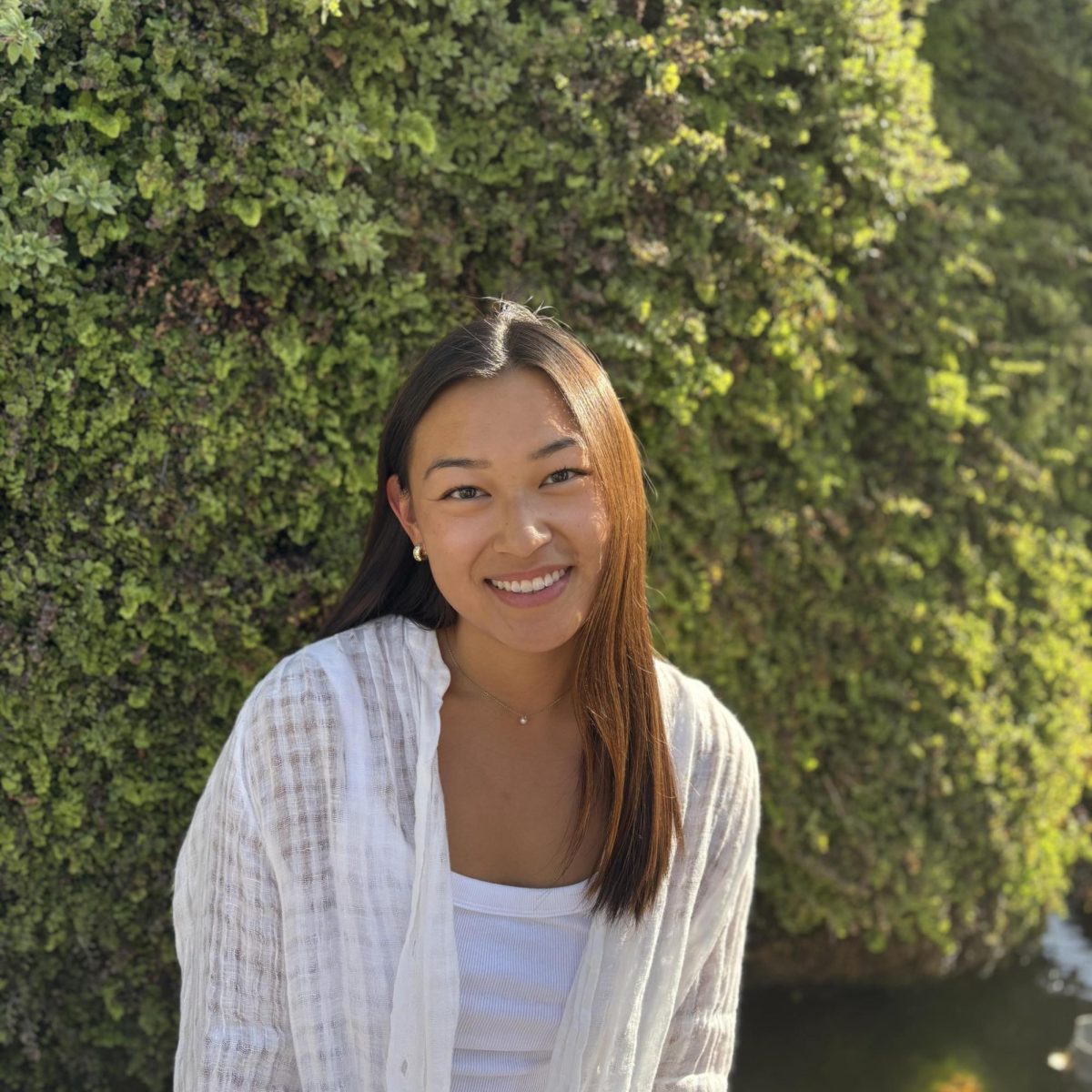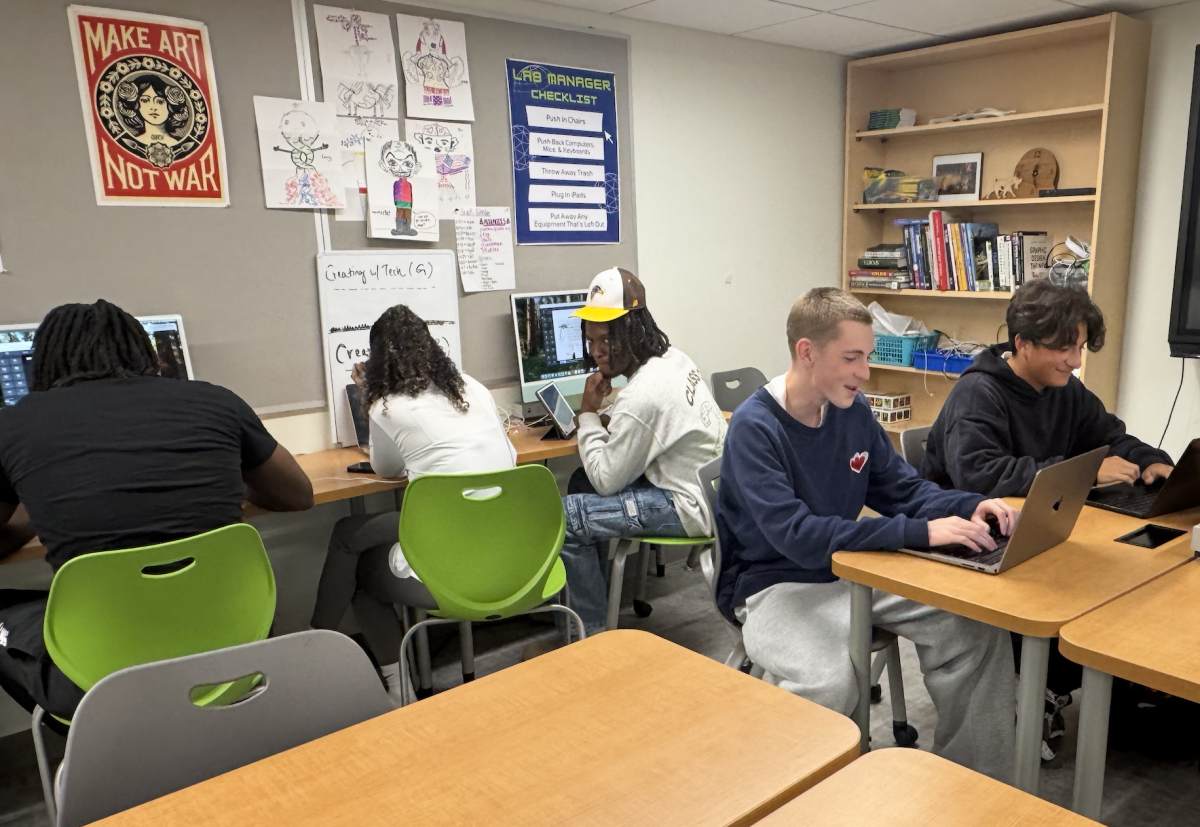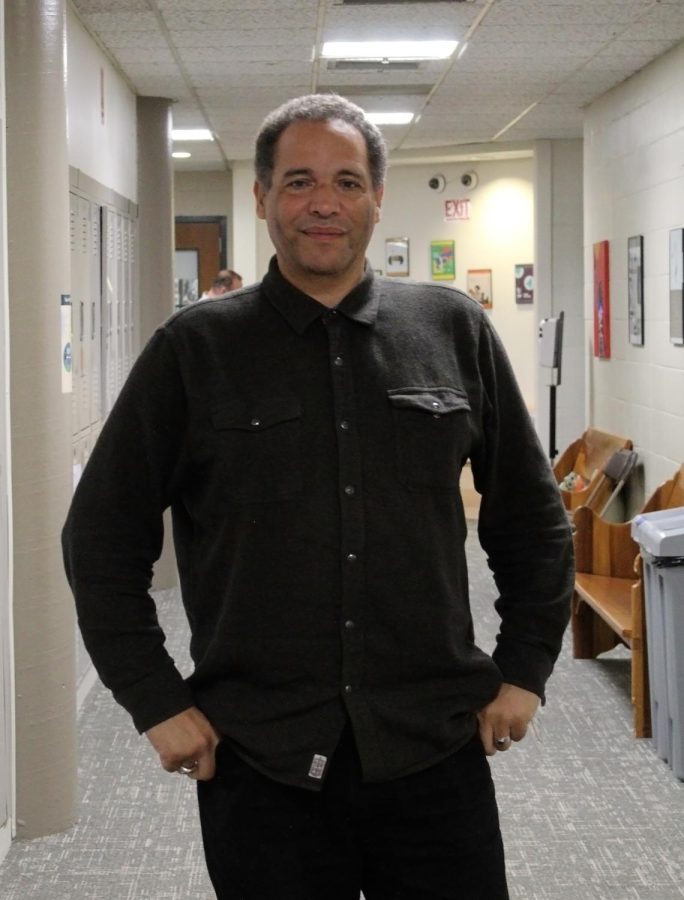Malik Mubashshir: Religious Thinker, Historian, Constant Reader
Malik Mubashshir, Upper School Religious Studies & History Teacher
Today, Malik Mubashshir is in his 5th year teaching Comparative Religion, African-American History, and Peace and Social Justice at Friends Select. However, as a child, Malik thought teaching would be the last job he would grow up to have.
Malik grew up in Newark, Delaware, as an only child with “a great family, a great education, and a love of reading to pass the time.” He read everything from African American literature and history to monster stories like Dracula and Frankenstein. He was interested in how science challenged the idea of what humans thought was possible. “[Frankenstein] meddled with things man was meant to leave alone… I didn’t agree with how religion tried to repress scientific discovery, science should push the boundaries with things like stem cell research, space, extension of life,” Malik says.
As Malik got older, he continued to read and became involved in a fundamentalist baptist church. This was one of the starting points for his lifelong interest in religion. He was committed to the church as he read the Bible intensely and became an assistant minister at 16. However, at the time, he had no frame of reference for religion, no knowledge of other sects, and had nothing to compare his experiences to. But as he read further into different forms of Christianity, specifically “Jesus Freak” literature, he felt that other groups aligned more with Jesus’ true word. When racial differences presented themselves, Malik, one of the few people of color in his community, began to receive backhanded comments and experience racial prejudice. After this, he “became gradually disillusioned with the church over time.”
Around the same time, Malik discovered a TV show from the Nation Of Islam called Muhammad Speaks. Here, Malik identified with black men like himself preaching about how black people may be God’s chosen people. Malik also gravitated towards martial arts at this time, he got his black belt in Kenpo karate at 17, right before he left for college. He was also interested in the philosophy of karate, as he read texts about Zen Buddhism. These experiences gave Malik an introduction to the possibility of new religions, so he decided to explore religion in college to hear other perspectives and see where he fell.
Malik went to Harvard University and commends them for having a strong religion department. He appreciated being able to learn from some of the great intellectuals in the study of religion, taking classes like Christian Thought, Comparative Religion, and World Religion. He was able to compare religions, learning the beliefs and challenges for each one, so he came out “more grounded” and with much more knowledge. He also did not limit himself to academics; he went to different churches, synagogues, and mosques on the weekends. “I wanted to make sure I was at least conversant in all these different traditions, it was never just academics for me, it was deeply personal. I wanted to find a philosophy for living,” Malik explains.
After college, Malik took the job he thought he would never have, teaching. His mother, father, grandmother, and aunt had all been teachers. He considered ministry but ended up working in after-school programs, which developed into full-time teaching positions. Malik lived in Boston for 9 years after graduating from Harvard, and then came to Philadelphia in the late 80s. He already had received his masters, so he applied to Temple for a Ph.D. in religion.
Many might assume Malik should be teaching at the college level, but he disagrees, particularly valuing the FSS community and seeing students learn at the high school age. Malik says, “It’s such a wonderful time to see people become adults, especially from 10th grade on…there is something really exciting about seeing young adults form, think deep thoughts for the first time, question what life means, how they were brought up, and start on their journey into life and into adulthood.”
Malik also details what he appreciates about FSS as a learning environment: “Students and teachers are given so much more autonomy to explore intellectually and personally… if a teacher has an idea for a course they can develop it into an elective, if a student has an idea for something they are really fascinated by, they can do an independent study.”
Over his time at FSS, Malik has taught Quakerism and Comparative Religion, Peace and World Religion, History of Muslim Civilization, African American History, Citizen Justice, and Western Philosophy, all semester-long history classes.
Ahmaad Fulton ‘22 has had multiple experiences in Malik’s classes. He says, “He took us to Harlem for my African American studies class, and we visited a mosque, and it was cool because he knew the people, knew the culture, and gave a good explanation and exploration of Islamic culture and what being a Muslim is.”
In the early 90s, Malik became a Muslim Imam; he has been an Imam of two religious communities. The duty of the Imam is to lead the congregational prayers. Muslims pray 5 times a day, and Fridays are the day of communal worship. It was Malik’s job to give a khutbah (a lecture), conduct funeral prayers, counsel, give religious instruction on weekends, and preside over weddings, which were his favorite due to the happy energy. However, he experienced some challenges. “I have been frustrated with the narrowness, and the intolerance, and the biases in all of them. I tried to have an influence in how I would interpret Islam to the people who used to come to our Jummah prayers, on Friday, and I think it was working. I had people come to me and say ‘I like your presentation because you make it relevant and you give me something I can think about and put into action,’” he says.
In recent years, Malik’s thinking has become a lot more secular than religious. He explains, “I think it’s because I’m frustrated with the fact that people can be looking at the same religions and coming up with such radically different interpretations, and I see religion behind the worst atrocities in history. So I am really kind of disgusted with the fruits of religion at this point.
However, Malik spent a lifetime learning religion and still values the importance of comparative religion classes. “Even if you are secular, you move in a world where religion has enormous influence, influence in art, literature, it’s a form of cultural literacy that makes you more effective. You won’t understand what is going on in the Middle East, you won’t understand the conflicts of the catholic church…without a basic understanding of religion,” he says.
Malik believes learning African-American History is valuable for everyone as well. “We have been invisible people, invisible people in these institutions, invisible people to ourselves… There is no American history without the presence and contribution of African-Americans.”
Head of the Upper School Chris Singler had worked with Malik for 15 years at Germantown Friends School prior to both of their times at FSS. “Malik has a nuanced understanding of complex issues…his course work in African-American history and his religious thought classes are outstanding due to his approach to learning… he brings a combination of building relationships and pushing students to do their best work — that is a magical combination,” Chris says.
English Teacher Matthew Rosen shares a classroom with Malik and through their connection, they have developed a form of co-teaching. “He’s a very generous colleague, intellectually generous. We have a good synergy, and can feed off of each other… He builds off of things I may say in class, and vice versa. It is almost a progressive teaching model, the more voices the richer the experience, it just enriches what I do,” Matthew says.
Aside from his teaching, Matthew also commends Malik’s character. “He is a very empathetic and likable person. He always has very good ideas, we often like to share ideas about books and about curriculum and we grow from each other.”
Jonas Gruber ‘22 has also learned from Malik over the years. “He brings in a unique life experience and world view that other teachers don’t provide, and it shows in his classes,” explains Jonas.
Outside of his work in the classroom, Malik has been a Private Investigator for 2 years, and is working towards his license. He has been attempting to enter this field since 2009. He works with Kitty Hailey, who has been doing investigations for 45 years now. He does civil rights cases, police brutality cases, wrongful incarceration cases, post-conviction appeal cases, and some others like slip and falls. He’s had to learn many skills in his new role. Some examples are: how to take witness statements, locate people that lawyers are trying to find for cases or settlements, how to write a report, how to conduct an interview, how to document evidence, and what to look for in a trial transcript for somebody he believes has been wrongfully convicted.
“Of all the cases we have done that are post-conviction appeals for wrongful incarceration, only one of them has been less than 20 years, these are young men about 19 and 20 at the time of their conviction… on lockdown with every aspect of their life controlled for decades knowing, in some cases, that they didn’t do what they were accused of doing and I’m amazed at how many of them seem to hold it together,” Malik says.
In the future, Malik hopes to continue to utilize the new talents he is developing and bring them to the Friends Select curriculum. He spoke on the possibility of a forensics class he could teach using all he has learned as a private investigator: “Everything I’m doing outside in other aspects of my life usually finds its way into the classroom… I would like to take young people who are interested in civil rights and just work on teaching them the art of investigation, especially civil rights investigation, because it is needed.”
Malik’s religious and educational journey led him to the Friends Select community and he will continue to inspire students both inside and outside of the classroom for years to come. He advises, “Be your authentic selves, you have a great community here, don’t hold back, be your true self, learn and grow, and take advantage of the community you have to sharpen your skills and grow as people.”





























